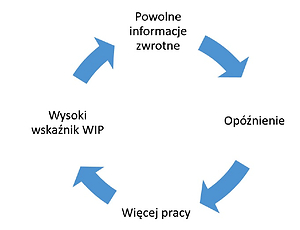An agile methodology for managing rail transport projects
1
Sieć Badawcza Łukasiewicz - Instytut Pojazdów Szynowych "TABOR", Polska
Submission date: 2021-09-13
Final revision date: 2021-09-14
Acceptance date: 2021-09-14
Online publication date: 2021-10-14
Publication date: 2021-10-14
Corresponding author
Natalia Łasińska
Sieć Badawcza Łukasiewicz - Instytut Pojazdów Szynowych "TABOR", Sieć Badawcza Łukasiewicz - Instytut Pojazdów Szynowych "TABOR", ul. Warszawska 181, 61-055, Poznań, Polska
Sieć Badawcza Łukasiewicz - Instytut Pojazdów Szynowych "TABOR", Sieć Badawcza Łukasiewicz - Instytut Pojazdów Szynowych "TABOR", ul. Warszawska 181, 61-055, Poznań, Polska
Rail Vehicles/Pojazdy Szynowe 2021,3,12-19
KEYWORDS
TOPICS
ABSTRACT
The increase in the complexity of tasks performed by enterprises requires the implementation of a modern approach to enterprise management. Competition and the dynamics of the business environment force the search for new forms of cooperation, reduction of operating costs, implementation of new management methods. Project management meets these requirements, accelerating the process of implementing new strategies and enabling to stay ahead of competition in the area of new products and services. The aim of the article is to present elements of agile project management methodologies, which can be used during the implementation of rail transport projects, which have so far been carried out on the basis of traditional project management methodologies. The article presents recommendations based on the results of research conducted in May and June 2021 among members of project teams implementing rolling stock projects co-financed from public funds. The results of the research made it possible to identify elements of agile project management methodologies, which can be successfully implemented during the realisation of transport projects concerning suprastructure.
REFERENCES (9)
1.
Hammarberg M., Sundén J., Kanban. Zobacz, jak skutecznie zarządzać pracą!, HELION Gliwice 2020.
2.
Managing Successful Projects with PRINCE2, TSO (The Stationery Office), London 2017.
3.
Kim SH., Whitt W., Statistical Analysis with Little’s Law, Operations Research, Vol. 61, No. 4, July-August 2013, pp. 1030-1045. DOI: 10.1287/opre.2013.1193.
4.
Knapp B. W., A Project Manager’s Guide to Passing the Project Management Exam, The Project Management Excellence Center. Inc., US 2006.
5.
Little J. D.C., Graves S. C., Little’s Law, [w:] D. Chhajed, T. J. Lowe, Bulding Intuition. Insights from Basic Operations Management Models and Principles, Springer 2008, pp. 81-100.
6.
Ockerman S., Reindl S., Doskonalenie Scruma. Przewodnik dla praktyków. O wyzwaniach, korzyściach i zwinnych zespołach, Wydawnictwo HELION, Gliwice 2020.
7.
Strojny J., Szmigiel K., Analiza porównawcza podejść w zakresie zarządzania projektami, Modern Management Review, vol. XX, 22/3 (2015), s. 249 – 265. DOI: 10.7862/rz.2015.mmr.48.
8.
Wyrozębski P., Biuro zarządzania projektami (PMO), Polskie Wydawnictwo Ekonomiczne, Warszawa 2019.
9.
Young T. L., The Handbook of Project Management. A Practical Guide to effective policies, techniques and processes, Koghan Page, London 2007.
We process personal data collected when visiting the website. The function of obtaining information about users and their behavior is carried out by voluntarily entered information in forms and saving cookies in end devices. Data, including cookies, are used to provide services, improve the user experience and to analyze the traffic in accordance with the Privacy policy. Data are also collected and processed by Google Analytics tool (more).
You can change cookies settings in your browser. Restricted use of cookies in the browser configuration may affect some functionalities of the website.
You can change cookies settings in your browser. Restricted use of cookies in the browser configuration may affect some functionalities of the website.



